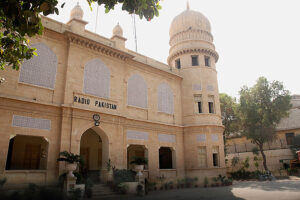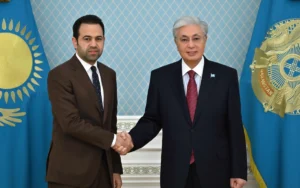Abay Kunanbaev

Abay Kunanbaev Founder of New Kazakh Poetry, Culture and Philosophy
Founder of New Kazakh Poetry, Culture and Philosophy
The traditional culture of Kazakh people originates from the traditions of the nomad’s life activity. According to experts of cultural philosophy, the nomad’s ways of cultural information transfer radically differ from the European culture. The originality of Turkic ancient culture is caused by a semi-nomadic way of life, broad trade, and cultural contacts with the ancient world of nomad tribes – Saki (Scythian) and Huns of the bronze era, with the complex structure of society combining military and tribe system with elements of military democracy.
Abay Kunanbaev is the founder of new Kazakh poetry, culture, and philosophy. Profound changes, which came about in the Kazakh philosophy due to Abay’s works, are characterized by the emergence of the new intonation and meanings of life, the inner world of the personality in the representation of existing spiritual and intellectual life of human beings. Practically Abay is the first one, who introduced the real person, his inner world into the Kazakh poetry; therefore, the full-fledged art anthropology in the Kazakh literature and philosophy starts from Abay. Profound and constructive innovations are typical of Abay’s poetic system. One of the innovations is a functionally active, semantically loaded metaphor. There are various types of metaphors in Abay’s poetry. We can find simple and difficult nonconventional metaphors, which are different from the canonical traditional metaphors of the old Kazakh epic poetry.

Abay Kunanbaev is a philosopher and the poet of the Kazakh people, the thinker, the translator, the educator, the founder of the Kazakh written literature. The classical writer and the philosopher Abay Kunanbaev lived in the second half of the 19th and the beginning of the 20th century. He was born in the Semipalatinsk region in 1845. His father Kunanbay was a governor and the foreman of the family of Tobykty. He was strict and exigent. The mother of the poet, Ulzhan, was a woman of unusual kindness, judiciousness, and patience. Abay’s grandmother Zere being a caring and kind woman had a huge influence on the formation of his main human qualities. She imparted to a little boy the love of poetry, literature, and folklore treasuries of the Kazakh people. Abay was a clever boy, he learned by heart the fairy tales, riddles, sayings, legends and epical songs told by his grandmother Zere. Later the eastern literature attracted the attention of the future inquisitive person. Abay has found esthetic ideals and fruitful spiritual sources in eastern literature. He read with pleasure the classical works of the ancient East, such as Alisher Navoiy, Firdousi, Saadi, Hafiz, Shamsi, Firdousi, Fizuli, Dzhami, Saihali, Nizami and others. The poet knew several languages. In the basement of the original languages (Arab-Iranian, Persian, and Chagataysky) he studied the works of religious and heroic eposes. He knew the Russian language very well. Being interested in the history of the Middle East, Abay has analyzed the historical works of Tabari, Rabguzi, Rasheedad-Dina, Babur, and Abulgazi-Bagadur-Khan. The poet was also familiar with the works of the first Tatar educators from which he absorbed the important didactic positions. Analyzing the works of the above-mentioned educators, he takes notice of the Russian literature, culture and language as well. Through the works of A. Pushkin, M. Lermontov, I. Krylov, L. Tolstoy, M. Saltykov-Shchedrin Abay reveals for himself the conceptuality and philosophy of the world. In virtue of translations into the Russian language, the poet became familiar with the works of the Western European classics, such as Byron, Goethe, Heine, etc. Since 1886, Abay attempts to translate and it helped Kazakh people to know the works of I. Krylov, A. Pushkin, and M. Lermontov. The translations of Abay from the Russian and Western European literature have enriched the Kazakh literature with new paradigms, plots, motives, and diverse types of esthetic thinking. M. Lermontov’s works, such as Dagger, Sail, Gifts of Terek, I go into the road alone and fragments from Demon sounded in Kazakh language with a powerful blow. The idea of brotherhood, unity and friendship of Kazakh people with other nations, was something like a course of the main creative and lasting philosophy for Abay.
Abay has pulled out the Kazakh literature from a static nearby folklore state; he has entered the original psychological introspective basis as the author’s subjective and anthropological issue – an image of the hero – the Kazakh person as the object of the image.
Abay deeply reformed all traditional poetic system of the Kazakh literature, removing initial graphic cliches of epic character and creating the richest system of new, individual author’s means of expressiveness, including tropes. In Kazakh, steppe verbal culture Abay has laid the foundation of the original European literary paradigm and discourse, which we define now as literary anthropology.
The poet of a sensitive soul with a negative reaction to injustice worried about his nation sincerely wanted his people to be competent, knowledgeable, and literate. Abay called Kazakh people for light under the title of Knowledge. In the poems, he has subjected to ruthless criticism of the faults of the feudal nobility. In the poetic works created in 1882-1886, Abay has concentrated attention on social, public, moral problems of the Kazakh people, has urged them to find a right way of civilized development.
Akhmetov writes that Abay’s lyrics are full of anger, condemnation, and grief of the poet caused by ignorance of the environment surrounding him, poverty, and down rottenness of the nation, the hard destiny of Kazakh people. The poet suffers from it because his life and the life of the people is far from an ideal of the free and independent human being, who is worthy to devote themselves to the society.
Abay called the Kazakh people for progressive knowledge, emphasized the necessity to study good things and remember the traditions. The respectful attitude to seniors and their honoring play an important role in the life of Kazakh people. The relationship of Kazakh people between each other is characterized by traditional ethics: indisputable and a firm respect for seniors, love, and care of youngsters.
Taking into consideration the principles of the Kazakh poet, it is possible and it is necessary to live in harmony with surrounding people and nature. Abay’s works are significant and correspond with the motives and invectives of the present days. The influence of his creative works on people, their importance is not becoming weaker; it is getting more powerful within a period.


